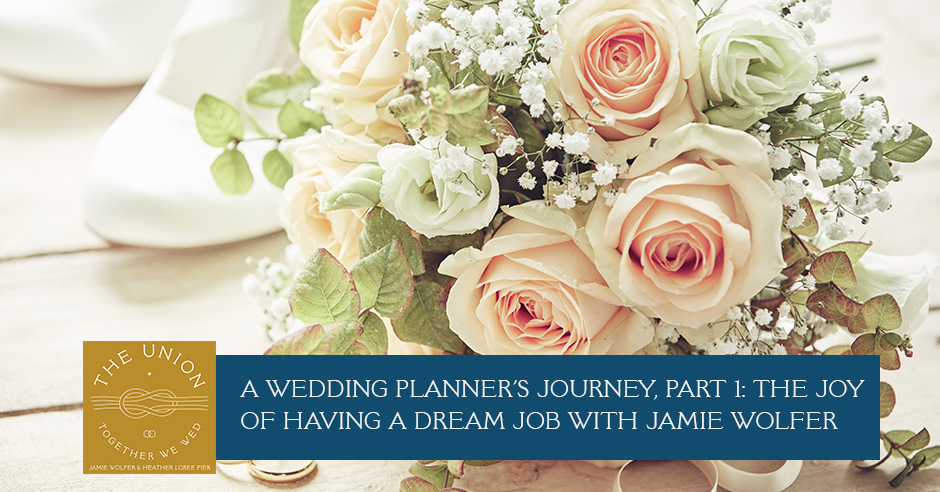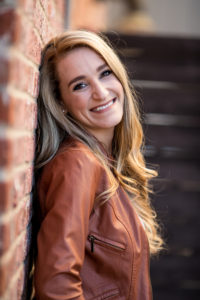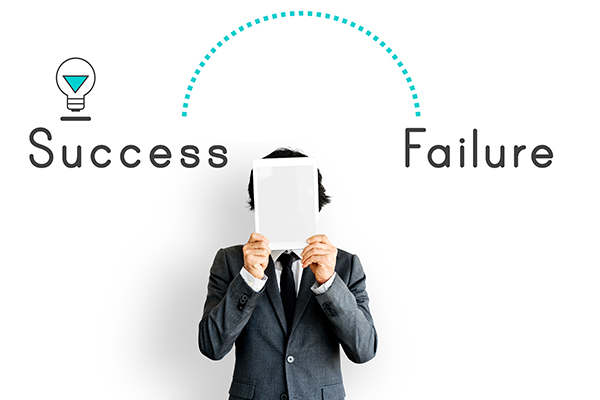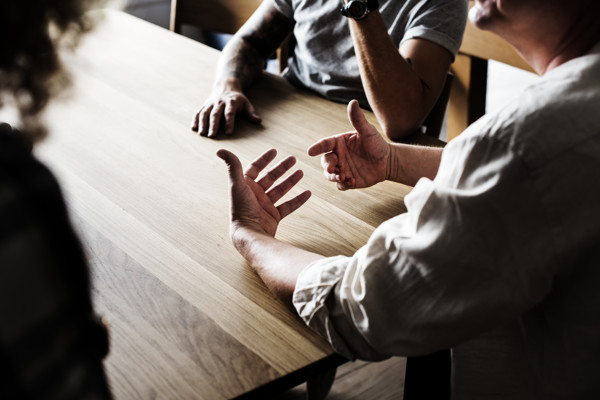
Nothing is more thrilling than doing what you really love and getting paid for it. For Jamie Wolfer, wedding planning is that dream job. Flipping their format in this episode, Jamie is interviewed by co-host Heather Loree Fier about her entrepreneurial journey. Jamie shares how she got started, her greatest moments, and the biggest lessons she learned. Jamie planned her own wedding and just refused to stop from there.
—
Listen to the podcast here:
Important Links:
- Facebook Group – The Union Podcast Community
- YouTube – Jamie Wolfer
- HoneyBook
- Zoe Sugg
- WEPA
- Instagram – The Union Podcast
- @HeatherLoreeFier on Instagram
About Jamie Wolfer
 Growing up in with a mother who could put Martha Stewart to shame, she learned the ins and outs of hostessing from one of the best. Large gatherings In her childhood home taught her the power of a well laid out appetizer spread and the ability to clean up after a storm of happy guests. Later, with a passion for rusty metal bits and wood worn by time, she spent most of her adult life working in interior design, specializing in vintage decor. It only seemed to make sense that she would combine her powers of event hosting and decor crafting into one blissful career: wedding planning. She first fell in love with the job while planning her own wedding, unknowingly feeding a habit that would soon spark a change in her career path. Her obsession has blossomed into a happy and full position at JW Coordination, and she would love for nothing more than to make your dream wedding a reality.
Growing up in with a mother who could put Martha Stewart to shame, she learned the ins and outs of hostessing from one of the best. Large gatherings In her childhood home taught her the power of a well laid out appetizer spread and the ability to clean up after a storm of happy guests. Later, with a passion for rusty metal bits and wood worn by time, she spent most of her adult life working in interior design, specializing in vintage decor. It only seemed to make sense that she would combine her powers of event hosting and decor crafting into one blissful career: wedding planning. She first fell in love with the job while planning her own wedding, unknowingly feeding a habit that would soon spark a change in her career path. Her obsession has blossomed into a happy and full position at JW Coordination, and she would love for nothing more than to make your dream wedding a reality.
In her spare time, she enjoys a good bourbon, watching Harry Potter with her three kids, and playing house with her favorite husband.
A Wedding Planner’s Journey, Part 1: The Joy Of Having A Dream Job With Jamie Wolfer
Jamie: In this episode, I am being interviewed. I am excited. This is my show and Heather’s the one interviewing me, but we could still be excited because I’m being interviewed. How fun is that? Also, hold on to your hats and glasses because I am going to be sharing a lot about how I got my business started and hopefully, it encourages you and if not, it makes you laugh a little bit or a lot.
—
Heather: This episode is a treat. We have special guests being interviewed, Ms. Jamie Wolfer herself. We’re pulling out all the stops for you. We are going to do interviews with each other because we did have this requested over in the Facebook Group where you should be hanging out with the other audience of the show and they wanted to know, how did we get started? What was our journey in this industry? I am interviewing Jamie about this. Jamie, how do you feel about being interviewed?
Jamie: I feel pretty good about it, to be honest. We’re going to have a ride this time.
Heather: Let’s dive on in with the first question. Can you tell us a little about when you knew you wanted to do this? Meaning being a wedding planner and a YouTube sensation.
Jamie: I knew that I wanted to do wedding planning because after our wedding I was like, “I liked doing that. I don’t want to stop.” I almost have this post-wedding depression because I was like, “This doesn’t make any sense. Why am I sad? Why do I miss doing this?” It was a weird inadvertent way of being like, “I want to keep doing that,” and I decided that I wanted to keep doing it. It was two months later that I booked my first client. I went out, I ordered business cards. Technically, I made my first round of business cards using wood paper and I printed them myself there. Honestly, I’m still obsessed with those cards except for they do need a massive update. A friend of mine made a rudimentary website for me. She did a bomb job. It wasn’t that rudimentary. I had nothing to put on there. I got business cards and I did a couple of styled shoots and I was like, “Let’s do this. It’s time.”
Heather: It sounds like getting started is jumping in and putting yourself out there saying, “I did this for myself. I loved it. I think I can do it for you. Let’s go.”
Jamie: That was 100% how it went down and it was convenient because my brother was in a local university at the time and he was surrounded by people that were getting engaged. The first couple that booked me was one of his best friends. It was perfect. He was my marketing department during that time.
Heather: A lot of referrals then were coming from that network?
Do your best to find a job where you get paid for nothing but your time. Click To TweetJamie: To kick things off, it was a lot of that or a lot of people who had known me in the past. I didn’t reach out. I didn’t do any cold calling. That is not my style. I know some people are good at that. It’s not me. I can’t. I did a bridal expo. I’d only been in business for two months and then I spent $1,000 getting a bridal booth and then I dressed it up crazy. In our first one, we’ve got fourteen weddings.
Heather: That is a huge success. It shows how powerful an event like that can be to network and talk to people face-to-face, let them meet you, get comfortable with you, and they want to work with you.
Jamie: I found it super interesting because no one else was decorating their booths. Dave who was on the show has been my mentor in this business for so long. He does wedding videography. If you read that episode then you know that he’s got a wealth of wisdom to share. I was like, “What do I do? He’s done a bridal expo.” I was like, “What does that mean?” He’s like, “Nobody decorates or if they do, they don’t do very much.” We’ve seen a change over the last few years and a lot more people are doing this, but a lot of people weren’t. We caught their eye with something pretty and then we roped him in with my over-caffeinated witty banter, I suppose.
Heather: When you bring him in, did you do a giveaway, a promo, anything like that helped capture more attention, or was it just a caffeinated banter?
Jamie: No, it was not the caffeinated banter because let’s be honest, that probably scared away more than it drew in. We did do a raffle and it was a 20% off on any package that you wanted to book. If I were to do a raffle these days, I would change it slightly, but it was exactly what I needed at that time. They told me their date, location, their guest count, ideal budget, and then the package that they were interested in. I got home that night. Anyone who stopped by could enter to win, put them all into a spreadsheet, and then, I’m going to let you in a little secret, Heather, but you can’t tell anybody.
Heather: I won’t tell. No one’s going to hear this.
Jamie: Everybody got a discount.
Heather: That’s generous of you.
Jamie: Honestly, that’s what many vendors do at these things is everybody’s a winner in some way or another. There were some days that were double bookings, so I didn’t offer it to them. There were some emails that I couldn’t read because it was illegible, but everyone got either 20% off or 10% off. I had quite a few people get back to me. It was crazy. I was like, “What is happening? I have no idea what I’m doing and they’re booking me.”

Wedding Planning: Always be frank with the failures and successes of any event and use them to grow professionally.
Heather: That’s where you were close to day one. That’s day 60 or so. You’re already booked up. Fourteen events in a year is a solid calendar for a lot of people in this industry. Were you intending in going into this full-time, part-time? You have little ones and other stuff’s going on. What were your intentions?
Jamie: At that point in time, it was like, “Let’s see what happens.” The idea was to get it to be full-time. That sounded like such a dream at the time like, “How can it be a full-time wedding planner?” Also, be able to manage my hours and manage what I did. It wouldn’t mean 40 hours a week. It would be me, my main source of income. At that time, my husband had a well-paying job. We were fine in that department and we knew, “I’ve got the free time. I’m home with the kids. What can I do to be creative to get an income and do something that I enjoy?” It wasn’t that I was looking for 40 hours a week. It was that I was looking to bring in an income and simultaneously do something that thrilled me to no end.
Heather: What about this whole thing? You enjoy planning your wedding, but what aspects of it drew you to going pro?
Jamie: I feel like there are many. My dad is a pastor and has been my whole life. We would always host these events at my house and I would watch my mom get ready for this stuff and my mother is a magical human. She’s one of my best friends so perhaps I’m a wee bit biased. What put together these luncheons that made everyone feel welcome at the drop of a hat and everything was well-organized. She would go as far as to right what chips would go in what bowl on a little piece of paper and stick it in that bowl.
Heather: I do love that. I would do that myself. I am 100% a fan of your mother. I have not even met her, but I do love her.
Jamie: Those crafty little things that I was like, “She thinks of this stuff.” That’s how her brain works. I would absorb all this and be like, “I want to do that.” Right before people would show up, she would then remove the paper and drop the chips in. It didn’t look cluttered. We didn’t have stuff all over the place. It was empty bowls waiting for the chips and then all of a sudden, we have ourselves a food fiesta because this woman was clever. It would be groups of 10, 15, 20, 100 people that she could do all of this at the drop of a hat. My dad would oftentimes spring it on her. To watch her masterfully put this stuff together, I was like, “That’s rad. I want to do that.” I also liked people, so that was fun to set something up and then watch them, enjoy her hard work. I worked in interior design for a couple of years.
Heather: Tell us about this.
Jamie: I assisted a guy working for a wholesaler. This company would import vintage pieces from around the world. They would sell it to stores that you see like in Laguna Beach and San Clemente. Tuvalu has a lot of their stuff in Laguna Beach and it was great. It was a wonderful opportunity. I walked into it going, “I’ve always liked how stuff. I don’t know what I’m doing, but I’ll figure it out.” I came to appreciate styling things and putting together vignettes and the power that could have when you put together something that looks gorgeous. Even people who don’t know how to put stuff together like that can appreciate a well-designed space or a well-designed room. I was like, “This is great. This is fun. I could see doing this.” I also worked in youth ministry for a while. We would plan these events, these weekends, these retreats or trips and the logistics behind the scenes, maybe I’m going to brag. I was like, “I was good at it. I liked it.” Planning my wedding was the perfect convergence of all of those three things.
I was able to take my mom’s craftiness and the way she could magnificently pull something off with a little forethought, a little bit of like, “I’m going to think this out. I’m going to think through all these steps real fast and be prepared to try to get it done quickly, efficiently, and wow people when they come in.” I was able to create something that I thought was beautiful, that I wanted people to enjoy the aesthetics of. I was good at the logistics. I enjoyed it. I loved calling vendors for quotes. What? That’s not something that most people find enjoyable, but I was thriving in the spreadsheets, in the checklist, in the timeline. It all fell together. All of these different areas of my life that I enjoyed and spent a lot of time working on were all covered or encompassed in wedding planning.
People who receive good service will talk about it.People who receive good service will talk about it. Click To Tweet
Heather: It sounds like wedding planning is and was back then your dream job, can we say?
Jamie: Yes, that sounds about right.
Heather: It’s bringing all this together and with a job being fun, it generally also aligns with you being good at a job. What we’re seeing here is you’re good at this. It’s fun to you and it’s not just work, it is something you would be willing to do for free because it feels fun, but you’re fortunate enough to be doing it and getting paid. You touched upon this a little bit, the initial investment you put into getting started, but do you want to dive into that for those who are thinking and want to start a business and want to know what this is going to take.
Jamie: I’ve got a couple of different facets to my business, but if we’re talking about the wedding planning specifically, I sweet-talked my husband into saying okay and into saying yes to that bridal bazaar. I used the income from that first couple that book to me. I hadn’t done any advertising. I hadn’t done anything. I took $1,000 from that and put it towards the bridal bazaar and there’s more money spent to make it pretty. I spent a lot of time designing that booth. It took forever. There was that upfront, let’s call it $1,500 and then I printed up stuff at home, flyers or a price sheet for people to take a quick look at. That was minimal at best. It was finding the right logo and the right fonts and those things.
In that aspect, I spent the time doing it myself instead of spending the money to have somebody else do it. Business cards were a little more expensive because like I said, it’s the coolest wood paper and I can’t wait to order another round and remake them with our new logo. It’s gorgeous. I love it. That was maybe another $150. At that point, it was a hustle. It was a matter of getting people to book us because that’s the cool part about having a wedding planning business is there’s little overhead if you don’t want there to be.
Heather: Especially when you’re getting started and you’re doing a lot based on referrals. If you’re doing a good job, you’re building your network organically. You’re not having to go out and run a bunch of ads or put billboards up or get a physical retail space. Those fees come up with other types of businesses. It gives you the ability to make some money and reinvest it into going bigger if you want or not if you only want to do it part-time. There are all sorts of options.
Jamie: In fact, right before I started this, I talked to this gal who’s in the wedding industry who works for a wedding blog because I had lost a job. I went to her hoping that she would get me one. We went out to grab drinks and I was like, “How do I work this into a conversation? What do I do?” She said frankly before I even had to ask, she was, “Trust me, I would hire you in a heartbeat. I just don’t have space. We don’t have room on our team.” She goes, “I’m going to encourage you this. Do your best to find a job where you get paid for nothing but your time. No products, no investment. Just your time.” This is before I planned my wedding. Knowing that nugget of information because then I don’t have costs. I don’t have a product I’m buying. I knew that would be a smart move moving forward. I planned my wedding and went, “This is fun,” and I realized, “I don’t have to throw a lot into this if I don’t want to.”
Heather: That is a beautiful part about this industry and with the economic climate and things being a little more challenging in this space and in-person events aren’t happening as easily or as often or to the same scale, you’re not paying the overhead of retail space. You don’t have hundreds of thousands of dollars of inventory sitting in a warehouse that you can sell. Yes, you don’t have money coming in because you can’t put your time out there but you’re not in the hole a bunch of money because of those overhead costs. It is a unique thing with the way this business works. For your journey as a planner, things seem to kick off when you decided to go towards YouTube. What led you to that and how did you feel going into it? That had to have been scary to put yourself out there in that way.
Jamie: It was scary. I had owned the camera that I started filming on a year and a half before I ever started filming videos because I knew I wanted a channel. I started super actively watching YouTube in 2014, 2015 and there’s this one YouTuber that I follow who I adore. Anyone who watches any piece of my content knows that I’ve mentioned her before. It’s Zoe Sugg. She’s such a cute little British nugget and I love her. I would watch her make these videos and I was like, “I want to do that. That looks like much fun,” and then I realized coming across a normal person on camera is harder than it looks.

Wedding Planning: Always be aware of the power of word of mouth. If you deliver quality service, the clients and guests will remember you.
I spent a long time practicing, which I was putting it off because I was scared. I knew I wanted one. I chose weddings and chose to talk about weddings because it was a subject that I knew I could talk about that way it’d be more factual and educational. It wouldn’t be me doing makeup because I like makeup, but I’m not makeup artists or me doing DIYs or how-tos in your home, which is funny because I have a second channel where I do all that stuff. I chose weddings because I was like, “I want a channel. I know stuff about this. Why not?” The first a few videos were rough and no one will ever see them.
Heather: I want to see them.
Jamie: I am pretty sure I deleted them.
Heather: I’ve seen the one in your car. I went way deep in your YouTube and you in a cool car. What was that?
Jamie: It’s a 1985 Chevy Suburban that it’s been in my husband’s family for years. It was my father-in-law’s and then he gave it to us. He ripped out the interior and there’s a plywood ceiling and the AC doesn’t work well and it’s loud in that car. I was like, “Jamie, you’re going to keep pushing this off. Make a stupid first video on purpose. Make it bad because anything will be going on from there.”
Heather: They say, “Start ugly.” Get out there, do something and then you start learning and they get better and look at you now, you’re a superstar. I thought that the first video was good. I went back and looked at it because I’m like, “How good has she been at this for how long?” I was captured by that video immediately. I was like, “She’s got her kids. This car is cool and I want to be friends with her.” You’re doing a good job with this video. That’s all I’m saying.
Jamie: That one is a little bit better than the few that followed it, which is hysterical because I posted that on purpose so the rest would be better. I was quiet and unsure of myself while recording because that’s before I redid our upstairs guest bedroom two double as my recording space. I was doing it in the office and Silas was a baby at the time. I don’t want to be too loud because they didn’t want to wake him up when he was napping because that child was the worst napper. He would go 30, 45 minutes and then he’d be up and I’d be like, “Your sisters didn’t do anything like this? They took marathon naps. What’s wrong with you?” If he fell asleep, I’d be like, “Nobody makes any noise.”
Heather: That’s the mom part of her life. Getting that started in the little increments of time in the day. For those people who are reading, who are thinking they want to go into this and have kids, what are the essential things they should be working on first? You mentioned some already have a website, business cards, get yourself out there. What things do you think is the highest priority to squeeze into those little time windows that they have in the day when they’re not handling the little chance?
Jamie: For me, it was trying to make sure it’s providing quality work to the few clients who had hired me. When I had time, I was being intentional by making sure that I was providing good service because people who receive good service talk about it. They enjoy it and I wanted them to enjoy their wedding planning. One of my main focuses was I’m not looking to grow my business massively. One, because I don’t think I can handle it. I’m new. I’m not ready. Two, the quality control would slip. I wanted to make sure that everyone was enjoying the experience that they were having. It was a lot of late nights.
It doesn’t matter if you start ugly. Get out there, do something, and when you start learning, you will get better. Click To TweetI would go on Pinterest and I would compare timelines and be like, “What do I like about this timeline versus this timeline? Do I agree with that? Does this make sense?” I would spend those little nuggets of time researching more and comparing it against what I had seen and what I knew to be like, “I disagree with this especially because after last week’s wedding.” It’s almost like my own version of continued education. It was that combination of making sure the clients were getting a great experience and making sure I was sharpening my skills as best as I could by comparing things and contrasting. It was a grind and I don’t want to make it sound like it was super easy. I chose to take on less clients so I wouldn’t be drowning.
Heather: What systems did you use early on? I know it was a little more scattered and folders. You’ve shared this before and now you have your sweet HoneyBook as you call it. There’s been a progression but early on, you’ve got to start ugly. You’ve got something and then you incrementally improve. Tell us about how you started.
Jamie: Organizationally, I had binders. Each couple had their binder and it made me feel posh because I was like, “Look at these ten binders. It’s great.” To this day, I’m still a pen to paper, note taker, not digital. I have three note pads sitting next to me. It’s embarrassing.
Heather: I can relate. Joe my husband came into my office. He laughed. He’s like, “Why are there many separate notepads?” I’m like, “That one’s for this project.” I keep them in little separate notepads so that I know if I have a note, I need to look back on about X project. I go to that folder or that notepad and it’s in there. He thought I was weird, but whatever. He doesn’t know. I like the notes too.
Jamie: That’s hysterical because mine are not sectioned off. If there’s something that I want to share later, I’ll jot it down. These are my miscellaneous notepads or the list of things I want to get done for the day. I still have a wedding binder. It used to be a binder for each client, I’d write notes down for that client in their specific binder. We have a massive three-ring binder where every time I’m in a meeting I take notes on it. All the couples are in there and it’s all one solid glob of notebook paper, but I know it’s done in chronological order, so I’m like, “How long has it been since we met? I’m going to flip to write about this.” The intent is to go through and organize all of them but mostly it’s for me to refresh my mind on what we’ve talked about. At first, it was binders and I printed out every single contract and I printed out everything and I would print out multiple timelines to hand out to people on wedding days. I had spares to pass out to the bridal party if they wanted it. I’ve since chosen to save more paper and we email it instead.
Heather: People have their phones now. Even in the last few years, the way people use technology is different. Printing out a piece of paper and giving it to them, they’d be like, “Can you text me this document so I don’t have to carry this around?” You’d be like, “I printed that for no reason.”
Jamie: We graduated to Google Drive and I still use Google Drive a lot. We’ll organize and upload contracts there. I do find that the user-interface to be user friendly for many people. We still use that quite actively.
Heather: That’s where you started now, you’re with HoneyBook but still using Google and any other any little tools in the mix there that are handy on the day-to-day basis, or is that about it?
Jamie: I feel like we about all of my secret weapons on that, like the apps, the show that we did. I will say day-to-day stuff that helps me, API is fantastic for posts. We use that for our main Instagram. I’ll sit down once a week and write out all the captions. It makes me look like I’m posting every single day, but I’m not, it’s doing it for me. HoneyBook is where it’s at. I’ve used them for years and they have such a great interface and many people respond well to it. My biggest fear is always double booking, accidentally double booking.

Wedding Planning: You’re going to have so much more success with a targeted niche than just being a wedding planner in general.
Heather: That problem if you get yourself in that situation because both of the clients or whichever one you’re having to handle, backtracking. They take away all the worth out of them that you’re like, “I know you decided to work with me but now I don’t want to work with you.” That’s an awkward conversation to have.
Jamie: It’s the worst and why do I know? It’s because I did it. There’s one other thing that I do have. This is how much I love to see big picture stuff. There’s a wall in our office. I have a twelve 1×1 foot cork mats that I’ve spaced out. There’s four in each row and there are three rows. There’s one for each month. What I do is when I book a wedding, I will write it down on a post-it or piece of paper and pin it to that weekend. Anytime, I’m like, “How many events do I have?” I will walk into my office and I can count the post-its. I love that thing. I don’t know why the big picture is helpful for me, especially in person tangible. I can move pins if I need to. We’ve had some events rescheduled I can go ahead and scoot them around. I love it so much.
Heather: A little more moving pins this year than normal. I love big calendars like that too. I have something about a nice big whiteboard or a huge calendar that I’m like, “I dig this. This is helpful for me to feel grounded as I’m planning things.” You’ve had a lot of success here. Your business is doing well. What do you think has helped make your business grow? I know we’ve talked about a lot of things on the show before, but if you could pin it down to 1 to 3 things that you think made the difference for you, what would they be?
Jamie: I would say one of the first things that I did, even with my first, second, third event is at the end of every single wedding, either that night or the next day, I would turn to my assistant or whoever had been helping me, which funnily enough, in the beginning, was my mom a lot of the time. I would say, “What went well?” We talk about it and I’d say, “What didn’t go well?” We talk about it while it was still fresh. A lot of times what I realized is things that didn’t go well, they weren’t necessarily my faults. That was an important distinction for me because often I go straight to shame or embarrassment of like, “I dropped the ball.” There were moments of that and that’s okay. That’s part of learning and growing. It was mostly, “The DJ didn’t do this when he was supposed to. What could we have done differently that would have changed that?” We continuously, and to this day, after every single event, I will either talk to the assistant that I’ve been working with for that event, or I’ll call my mom up and I’ll be like, “Mom, let’s soundboard this because I need to talk through.” She’ll go, “How did it go? What went well? What didn’t go well?”
We have this great system of, “Let’s talk about it. Let’s be frank with the failures of the night or the successes of the night.” It’s the biggest piece of growth. One of the best things I could have done for my business is to go, “Let’s talk about scripts. Let’s get them out there.” Even if they are my fault, what can we do better next time? Every single event has good stuff and has bad stuff. Sometimes they’re great and the bad stuff isn’t that bad. Sometimes you’re like, “I almost decked that vendor.” That was a big deal. That’s been helpful. The biggest reason we’ve seen growth and we all know it’s because of YouTube. I found out that YouTube is the second most used search engine.
Heather: I wish I had a little teaspoon of your talent to be able to go on there and do that. I am still the zebra on video. I feel awkward. Maybe you can give us some tips on how to break through that and be like, “I’m going to own it. I’m going to be awkward in my head. Maybe some people like my awkwardness.” Maybe they’re like, “This is my weirdo that I want to watch on YouTube.” That’s what they think about me if I was there.
Jamie: That’s what people connect to the most. I’ve seen hundreds of comments appreciating me being me, appreciate my realness, and me being funny and self-deprecating when it calls for it. I gave a talk in an online wedding summit on the power of YouTube and why vendors should be using it. It got me thinking, Heather, I didn’t even talk to you about this. It may be worth a full episode because I gave an hour-long talk on it.
Heather: Tell us a little teaser for people to know they want to listen to this future YouTube episode.
Jamie: This is an important factor. Before Dave started his YouTube channel, we went to a mixer with WEPA and I had brought my camera along with me intending to film but never ended up doing it. I started to record and all of a sudden Recording Jamie came out and he goes, “What was that?” He’s known me since I was fourteen. I was the best man at his wedding. Dave and I know each other quite well, although we love his wife probably more than we love him now because he married up and we love her. This is a long friendship. I ended the clip and he’s like, “What did you do?” I’m like, “I added vocal inflection and some hand movements.” As we’re talking, I’m like, “Yes, blah blah blah.” If all sudden, I turn up the vocal inflection a little bit, and then what I’m saying becomes a little bit more interesting because I turn it up a teeny bit. I’m still me. I’m still talking the way I normally talk and adding inflection and some hand movements to keep people entertained.
Every single business you see in the world was started by some person who was crazy enough to try and go do it. Click To TweetHeather: I’ve been trying to do that on my Instagram Stories. I don’t know if I’m nailing it, but I’m getting better. I’m avoiding making the terrible noise that you pointed out to me on this show. I’m learning from you. This is excellent. I’m getting coached by a YouTube superstar. Someday I will make some YouTube videos that are worth watching. It’s going to happen someday.
Jamie: It’s going to happen. I’m going to make you do it. It’s funny because when Dave started his channel, he was like, “You’re right. If I talk normally, I seem dead.”
Heather: People want to be entertained. They’re watching YouTube for some entertainment. They want to learn, but they want to be entertained.
Jamie: It’s unreal to me. I don’t understand it. I already clearly have a big personality. Adding dynamics to it especially if you’re not moving. I sit on a bed, that’s not visually interesting. How do I keep people’s attention?
Heather: People need to become YouTube stars and then they’re set. That’s it. They’re good. Realistically though, what can they do if they’re like, “No way, no how, I’m not making YouTube videos.” What are some other ways they can get some growth going? What tips do you get for them?
Jamie: Always be aware of the power of word of mouth. If you deliver quality service, the clients, the guests, and the vendors will remember you. The amount of times we’ve had vendors be like, “This is different. We enjoy working with you. Other planners aren’t like this.” That wasn’t necessarily a broad sweeping statement, but they’re like, “We’re having fun.” For us it was, how do we treat everyone like a potential client or a potential referral? Just kindness. We’ve been shocked by the number of times a vendor comes back and says, “I have a couple that you would be a great fit and we’d love to work with you again.” I’m like, “What? We told some fun knock-knock jokes.” I doubt that was the reason, but because we made it a great experience for all involved, there’s so much power being nice to other vendors.
Unfortunately, it sounds like the landscape out there with other planners may not exactly do that. Be kind and think of the needs not only of your clients but potentially of the guests and be aware of guests around the sun. Moving things along to make sure everyone’s comfortable and enjoying themselves and then be nice to the vendors. That’s been such a huge part of our growth is because then we’ll get referrals and that’s not why we did it. We did it because we like people and the inadvertent benefit was people refer to us because they want to work with us again. We made it a good and fun experience.
Heather: That right there is huge negative wisdom because many weddings I have attended where there are planners, I don’t see that there’s a good flow between the whole team. I do this as a job, so I’m watching a little more closely than what a general guest at a wedding would where I can see little moments where it seems things are a little off and there’s a little tension between the staff running around. Working at an event that, if you can avoid that tension and get the entire collective wedding teams to work smoothly, that’s huge. The other vendors appreciate it because they don’t always get that experience. That’s the way to referrals. I agree.
Jamie: It’s because I love people. I am an Enneagram three, and I want them to like me. There are elements of that. There’s been a lot of growth and this business has been one of the best things that have happened to me in that respect is recognizing that like, I still have to make decisions and it can’t always be like, “Just love me.” It aims from those wanting people like me and part of that’s great. Part of that’s unhealthy, whatever. I’m recognizing it in myself.

Wedding Planning: No matter what you do, you will always find clients that aren’t exactly satisfied with your services.
Heather: There is a lot that is good from that too, as long as you’re keeping it where you’re not being a doormat. Weighing that in the equation and you’re good. If you look back, what do you say were your overall biggest successes and your biggest challenges?
Jamie: My biggest success is YouTube. It’s not what I expected and it’s not what I thought it would be. It’s 100% the biggest income for our family, and it’s my sole source of leads. Outside of that, because I know a lot of people are like, “We expected Jamie to say YouTube.” The way we were able to secure word of mouth referrals for the first few years of business, I was blown away by. There was much power and success in that because then these groups of adults would be like, “Getting engaged, who do you use? What do you do?” If they had a great experience with us and they recommended us. I’ve never paid for an ad. I might have boosted a poster too on Instagram, but we’ve never done advertising. I’ve done three bridal bazaars total I don’t even know how many years. It’s been harnessing that power of word of mouth.
Heather: What about the challenges? What were the biggest challenges and how did you move through them or grow from them?
Jamie: It’s the flip side of that people pleaser in me because I would back down in situations where if I delivered the information confidently, no one would question it. It was a huge level of personal growth. That’s why I said it a little bit ago, that this is one of the best things that’s happened to me personally because I had to learn no is no or yes is yes and to be definitive. Almost in some situations where before I didn’t have a backbone. I allow things to happen because I wanted everyone to be happy. The challenges from what I know, not to the bad review point, but we’ve had two disgruntled brides. I can pinpoint exactly how my behavior created a relationship that allowed that to happen, which is a weird way of phrasing that like, “As long as you’re happy.” When I changed the narrative and delivered it with confidence and kindness we’re not bullying them, but it was when I didn’t stand up for myself, I created these relationships in such a way that tilted the scale that I looked like I had no idea what it was doing.
Heather: Maybe the intention or the deliverables you were supposed to provide weren’t as clear because you were being vague or adding things that weren’t easy for your team to deliver those things.
Jamie: I would be like, “Yes, we can do that. To make sure you’re happy, I’m going to go ahead and add on an extra hour for you free, and based on your venue layout, I’m going to add in a third person.” I did this with a bride who was upset and added on a note. We’re going to keep adding on stuff and she was still mad. Learning that like, “If I keep giving you stuff, you’ll end up being happy.” No matter what, you’re still going to end up finding clients that aren’t satisfied with your services. We’re all people, but learning that, no, this is the contract. No, this is what we’re doing and delivering that kindly, but still sticking to it.
Heather: It sounds like being an entrepreneur has been a big journey of growth for you and also had a lot of success. We’ll tip our hat to you, Jamie. Thank you for letting us interview you. I hope everyone reading enjoyed learning a little bit about Jamie’s journey.
Jamie: Thanks for making me feel cool and being on the show.
Love the show? Subscribe, rate, review, and share!
Join The Union Podcast community today:






